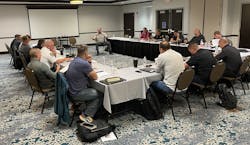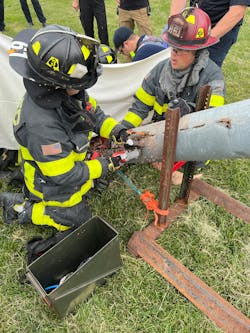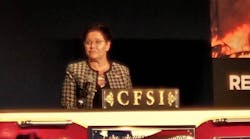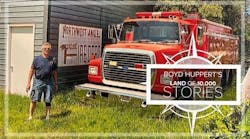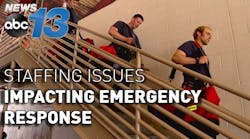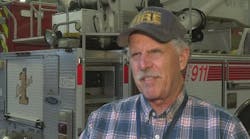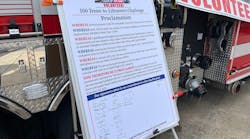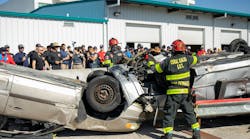The accomplishment of higher education—or what we like to call further learning—helps us to be more effective in our life and our profession. Further learning is a personal choice, challenge and process. Like all personal processes, sometimes the path is easy; other times it isn’t. What gets firefighters through the difficult parts is that they are problem-solvers, and they look at challenges as opportunities to better themselves in various ways.
It’s what you make of it
The outcome of most endeavors is determined by one’s mindset. Further learning is useful when one has a mindset that’s open to opportunities, not just black-and-white results. When an individual pairs that mindset with action toward an intentional set of driving goals or factors and with a functional decision-making process, that person is well on the way to a meaningful and rewarding outcome. When there are many—and, sometimes, unexpected—outcomes, such people are able to make the most of the situation.
So, wherever you start in furthering your learning, it’s helpful to anticipate that the decisions that you make will lead you down some rather crazy, nonstandard routes, reroutes, detours, alternate routes, roads that are closed and wide-open, smooth, straight roadways. In other words, periodically, things don’t go as planned. That’s OK. Further learning is a process, not an event. Plan to hang on and to hang in there when the path gets a little murky. This is just one more problem to solve.
Occasionally, the only thing that gets you through a difficult situation is simply deciding that you will get through it, no matter what. Learning is difficult work. The most important action that a successful learner takes is to keep going. Accept the challenge and get after it. Firefighters can do this.
Furthermore, remember that getting through challenging personal processes is easier when you are connected to people who are supportive of you, of your learning and of your success.
An opportunity-focused mindset sees the value in support systems and resources. Learning in a vacuum is a recipe for disaster.
The people who are in your support system can be family, friends, mentors, instructors, coworkers and bosses. Stay in touch with the people in your life who help you to do your best work. Although the process of learning is personal, it’s easier when you connect with folks who are supportive.The ‘why’
Part of accepting any challenge is figuring out your initial reasons for taking on the work. Actions of effective firefighters often are attached to an underlying drive for achieving a mission or a goal or a set of goals. The drive to further your learning is your “why,” so seriously ask yourself, “Why am I furthering my learning?”
From time to time, our mission and goals are related directly to work, such as meeting requirements for consideration for promotion. Other times, our goals are very personal, such as providing a more financially secure life for family. Whatever your reasons, give thought to your “why” and expect that your “why” might change as you continue the process.
Prepare to change
Ultimately, preparing to learn is straightforward.
It’s easy to do what we always have done, because we are wired to repeat behaviors that maintain the status quo. Learning is the opposite of maintaining the status quo. Once you understand that learning will feel a bit uncomfortable, you can get used to that feeling and proceed, knowing that you are on the path to getting better at your work and growing as a person.
The results of growing and adapting are universally good and can make a life-or-death difference in our business. What follows is a checklist that includes the familiar interconnected parts of a standard decision-making process. The parts include: critical factors, risk management, strategy and incident action planning. This process works for some of the most demanding decisions that firefighters make. It will work for a decision regarding further learning, too.Critical factors
This list of critical factors for evaluating a higher education program, which has served both authors well, was learned at the school of hard knocks, from which both authors graduated.
The weight of each factor will vary based on your “why.” Set up your list accordingly and be prepared to continually assess and evaluate.
· Staff: Instructors, administrators and support personnel are critical to an effective, customer-centered learning and student experience. Ask yourself, “Do they seem to take actions that support student development and success?” Remember, too, that the “admissions department” often is a sales department.
· Curriculum that’s found in a course catalog covers core/required courses, self-directed majors, internships, independent studies, special projects, electives and credit for prior training courses. Ask yourself, “How do I assess for quality?”
· Degrees, certifications and licensure that are offered by an institution include everything from a master’s in public safety administration to highly specialized engineering certifications. Ask yourself, “Are any specific to my ‘why’?”
· Schedule of classes and daily volume of course work, course schedule, total number of weeks (four- or eight-week block), quarters or semesters, delivery methods (in-person/online/blended) and expected hours of student engagement per week. Ask yourself, “What is realistic for my life right now?”
· Student experience: Engage anyone who you know who sought further learning. Then do the same with learners from the learning settings/programs that you are assessing. Ask them about personal and professional return on investment (ROI) and about their ability to complete/graduate.
· Accreditation is a set of industry standards that are used to vet a place of learning. Ask yourself, “Does accreditation of the school matter in relation to my mission, goals and ‘why’?”
· Value is the ultimate worth of the journey. Ask yourself, “How would the degree, certification and/or licensure serve to position me for a ‘next’ (expected and unexpected)? How many times will this learning turn out to be an ace up my sleeve before I ride off into the sunset?”
· BS detector: Ask yourself, “Do the people and the environment align with my needs? Do what I am seeing and what they are saying align? What does my gut say about the people and the environment?” Go with your gut.
Risk management
The benefit versus the costs that are connected to your “why” must be scrutinized.
Costs include time and opportunities that are deferred or missed. Calculate the weighted importance of each critical factor and build a summary of which critical factors are most important to you.
Then there are the financials (yours and theirs). These include the ROI, or pragmatic results, as it relates to your “why.” Sometimes, quality and price directly correlate.
Although there can be real bargains, a “free lunch” often isn’t free. Do your due diligence. Is the juice worth the squeeze? Optimal choices should align with your “why” and your necessary ROI.
Strategy/incident action plan
One’s further learning strategy should pave the way for you to optimize your choices. They should align with your “why” and your ROI. A key part of this is going in person to schools that you are considering. See/visit with real people. This will help to put you in a position to “believe your own eyes.”
You can go one step further by trying a class or two before you commit to a program. Monitor your experience by paying attention to your conditions, actions and needs in relation to your critical factors and risk-management process. Continually reassess your critical factors and risk management and adjust your strategy and incident action plan.

